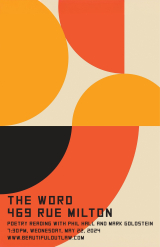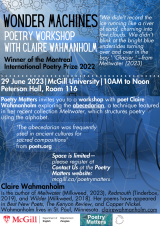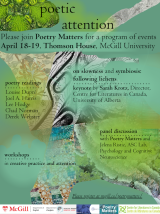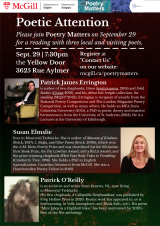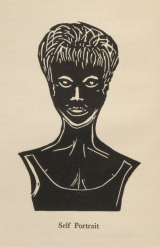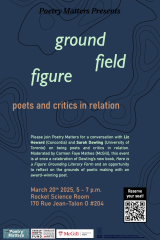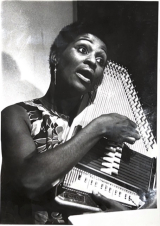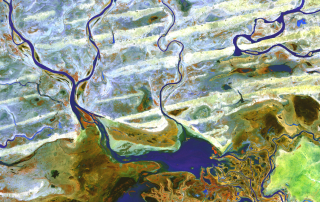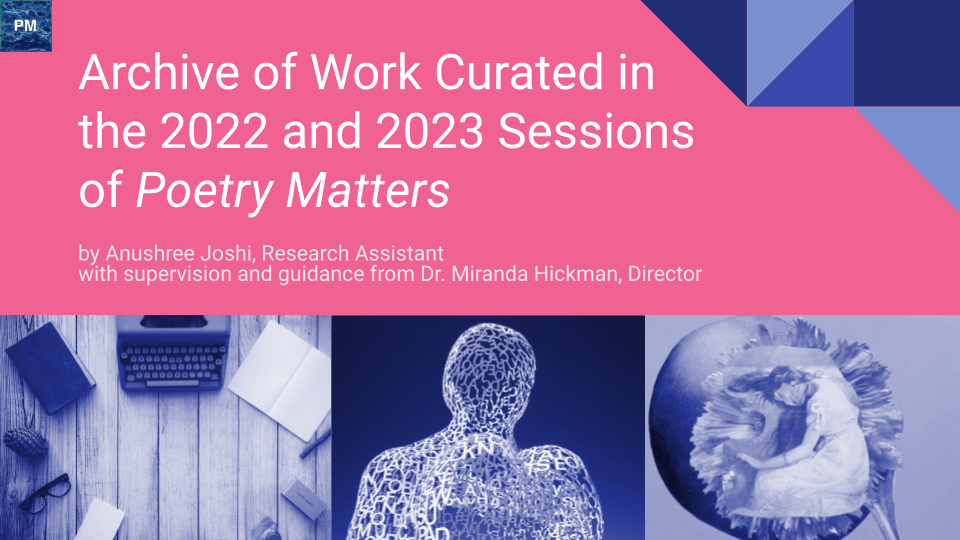Welcome to Poetry Matters
Poetry is not a luxury. It is a vital necessity of our existence. It forms the quality of the light within which we predicate our hopes and dreams toward survival and change, first made into language, then into idea, then into more tangible action. --Audre Lorde, “Poetry is Not a Luxury” (1977)
Poetry Matters is an initiative based in the Department of English at McGill University in Tiohtià:ke/Montréal, Québec. Our work leads from the inspiration of Montréal’s and McGill’s rich poetic history, including figures such as P.K. Page, Patrick Anderson, Louis Dudek, Irving Layton, Leonard Cohen, Barbara Althea Jones, and Anne Carson. With the support of SSHRC, the Montreal International Poetry Prize, McGill English, and the Linda Fernandes Fund, our project fosters research-informed conversations and poetic community within the university, in Montréal, and more widely, seeking to enrich cultures in poetry.
As a network of students, faculty, and poets, we aim to create space for exploration of how and why poetry matters in the contemporary climate, emphasizing cultural history and poetic form. Poet Audre Lorde suggests that through poetry, we can articulate those most deeply felt experiences which might otherwise go unacknowledged and unvoiced. For Lorde, poetry connects us with the truth of our experience, even when such experience goes unrecognized by the wider culture.
In our work of commentary, curation, and events – readings, talks, workshops, panels – we consider how poets from a wide range of backgrounds engage the cultural and political power of poetry. To address how verse forms and figures cross temporal and cultural borders, we draw from research engaging global poetries and diverse histories, considering identities from intersectional perspectives, as well as issues of cultural and linguistic translation. We explore different varieties of English and their shape in different global contexts; how to bring together older and newer, western and non-western voices; how to connect literary lives and afterlives; and how to address questions of difference, individual and collective.
Poetry offers an especially important resource at this moment of powerful need for language for acknowledging and communicating non-dominant forms of existence. We regard conversations on poetry as a means of making space and finding vocabulary for engaging such experience. Cued by poet Jennifer Bartlett, who writes from a disability studies perspective, we recognize poetry as a way of affirming ways of being in a world not made for everyone, as well as providing language for re-making worlds. As writer Claudia Rankine suggests, “we’re out/ to repair the future,” through poetic language reflecting on and responding to the cultural “weather” of our times.
Dionne Brand Reads from 'The Blue Clerk'


![]()
